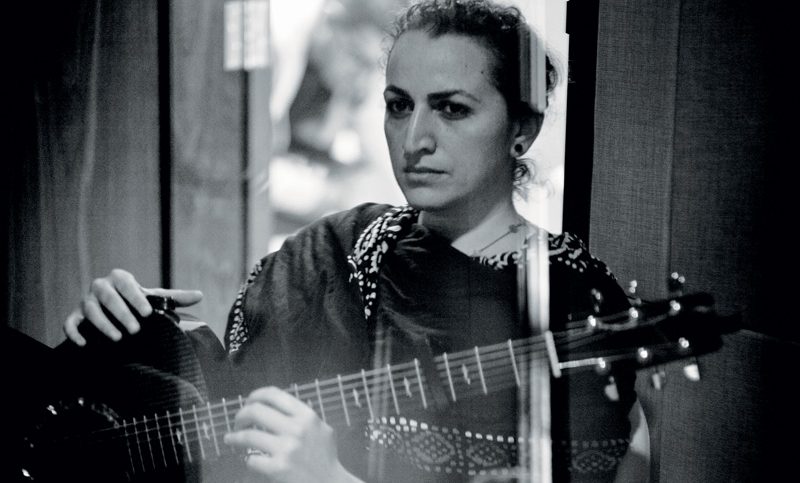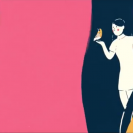I meet Reham Alsamerai at Jumo café at Sadu House, opposite the National Library, where the first edition of the Kuwait Film Festival she produced was held. It is a day after the closing ceremonies and Reham is exhausted but inspired.
She laughs when I ask her if she considers herself more a musician or a festival producer. The Kuwaiti musician, who describes her music as folktronica, regularly makes it on lists of Indie musicians to look out for in the Middle East, is also the co–founder of Green Caravan Film Festival and the director of NEST 2016 among other festivals she has been involved with.
“It really depends on what time of the year you ask me, “she says. “Because right now fresh of the festival buzz I would say I feel more like a festival producer because my brain is still in that mode, but if you ask me in a couple of months when all I am doing is writing…”
A self-taught guitarist, she started writing songs while in college in Florida when she joined a 5-piece girl band as a rhythm guitarist and back up vocalist. “It was kind of folk rock surf. We lived in Florida so we were very influenced by the beach and that sound,” she says. “We all wrote. It was good fun. And it was then when I had my first experience of being in a studio and recording and producing. And I quickly realized that I was much more into that then playing live, touring and all that. That stuff I can live without. But I really caught the recording bug.”
After a short-lived career in the oil sector as a new graduate, she pursued her passion for recording, working at a studio in Dubai’s Media City, learning on the job and went on to do a Certificate course in sound recording in London.
On her return to Kuwait, she set up her own small studio on the roof of her house “That was my most prolific period for a couple of years,” she says.
It was during a stint working at AUK as an editor of the in-house publications where she met Sandra Al Saleh with whom she set up the environmental consultancy Equilibrium and its project Green Caravan Film Festival.
Reham has one of those jazz inflected smoky voices. Many of her songs are searingly honest social commentaries about the environment and about moving between cultures. In the track “Nomadsong” she sings, “Nobody said I had to roam, I could stay home, and I would have but my roots got the better of me.” Now London-based, where she was posted as Entrepreneur in Residence at Goldsmiths College and where she also did her MA in Arts Administration and Cultural Policy, she has watched the music scene boom in Kuwait in the last two years from afar.
“I am really happy musicians in the country are finally being given opportunities to play. Because that is all they want to do,” she says.” It is a lot livelier, and light and fun.” But she is quick to add, “You cannot really gauge the music scene by me. I think anywhere in the world I would tend to be a bit of a recluse musically.”
During our conversation I quickly realize why Reham found my first question on whether she defines herself as a musician foremost or an arts administrator so funny. Throughout her career the two seem to interweave and film played an important role in her career.
Her music video collaboration with acclaimed French director Francois Vogel with her song “This Thirst” was commissioned by the Gulf Film Festival, but was deemed too critical to screen in Dubai. However, it did make the international film festival circuit where it picked up some awards. The makers of the documentary Speed Sisters also approached her and her songs “This Thirst” and “Lion Song” are part of the film’s soundtrack.
Reham sometimes keeps her festival producer hat on even when she is thinking about music. With the new creative opportunities coming up for artists in Kuwait, she has started to plug back into the local scene but with the idea of giving local artists wider audiences.
“I was approached by a festival in London to submit some ideas and I started to think what can I do that incorporates Gulf based artists and musicians to come up with a show or set of songs that can be taken to festivals around the world,” she says.
From her own experience she has contemplated the double-edged problem of nurture for Kuwaiti artists.
“When I was here there was this very obvious dysfunction in the infrastructure of nurturing artists. As an artist you don’t feel you have somewhere where you can go to for support, for funding, for equipment, for studio time,” she says. “But then I go somewhere like London where everything is at my fingertips but then I am lacking a different type of nurture which I can only find here and a different kind of inspiration which I can only find here because most of my songs tend to be about this place in some shape or form.”
“When I am living abroad I have everything I need physically as a musician but I am missing the substance that I need so it is kind of a dilemma. What can I write about in beautiful, green, lush London where I can wake up in the morning, pick up the phone, book a rehearsal space, pick a studio space, pick a session musician. But I don’t do it because I don’t have much to say when I am there. So it is very much a Catch 22.”
She has played several shows in London over the past years, but she has never performed in Kuwait. Will she? “Maybe. One day,” she says. Is there an album on the cards? “I am hoping that this summer I will lock myself away somewhere on a beach and record music,” she says.
As a fan of her work, I am keeping my fingers crossed for both.
You can follow Reham’s music on Soundcloud: https://soundcloud.com/reham or visit her website www.reham.live. Photography by Nousha Salimi.








